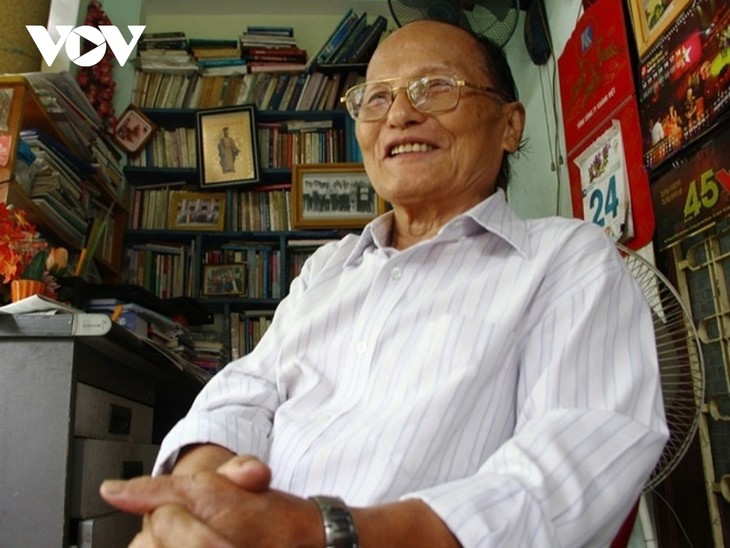(VOVWORLD) - Poet Giang Nam, the author of many well-known poetry collections, has passed away in Nha Trang city, Khanh Hoa province, at the age of 96. Written in a romantic, simple lifestyle, his poems are an everlasting source of inspiration.
 Poet Giang Nam. (Photo: VOV) Poet Giang Nam. (Photo: VOV) |
“My childhood was days to school
I love my homeland through every single book page
Who says herding buffaloes is suffering
I dreamily hear birds singing in the sky”.
The poem “My homeland” by Giang Nam was memorized by generations of Vietnamese people who experienced the pain and loss of war time.
“My homeland” was written in 1960 when Giang Nam, who was fighting on the southern front, received the news that his wife and eldest daughter had been killed in prison. Suffering from this great loss, he wrote the poem in one hour. The work soon became popular. In 1973, Nam met his wife and daughter and learned that the news of their death was the result of a mix-up.
Giang Nam’s poetry collection “My homeland” won him a number of prizes, including the State Prize for Literature and Art in 2001, the Nguyen Dinh Chieu Prize for Literature in 1965, and the second prize of the Literature and Art magazine in 1961.
“Giang Nam’s poems are romantic and embrace the emotions of his daily life during the anti-French and US wars. Giang Nam reflected the hardships of the war time in his poems in a simple and close-to-life way,” said Associate Professor Dr. Nguyen Cong Ly of the University of Social Sciences and Humanities in Ho Chi Minh City.
Giang Nam, whose real name was Nguyen Sung, was born in 1929 in Khanh Hoa province. Before the 1945 August Revolution, after finishing elementary education, he went to study in Quy Nhon city. At the age of 16, when the August Revolution occurred, he joined the army. Because of his writing ability, Giang Nam was made head of the Thang newspaper, the forerunner of today’s Khanh Hoa newspaper, where he adopted the pen name Giang Nam.
Witnessing the brutality of the foreign invaders, the poet reflected everything in the poems which he published in his newspaper. The poem “Return to temporarily occupied area”, written after 16 of his comrades were killed, was highly praised by literary critics.
After 1954, Giang Nam lived in Khanh Hoa province with the outstanding writers of the Gio Moi newspaper. In 1963, he was made Deputy Secretary General of the Literature and Art Association of Southern Liberation, and Editor-in-chief of the Liberation newspaper.
After national reunification in 1975, Giang Nam took over a number of positions, including member of the Standing Committee of the Vietnamese Writers’ Association, Editor-in-chief of the weekly Literature and Art newspaper, and National Assembly deputy. Later, he moved to then Phu Khanh province and served as Chairman of the provincial Literature and Arts Association. He also served as Vice Chairman of Khanh Hoa province’s People’s Committee.
During his writing career, Giang Nam wrote more than 10 poetry collections, and a number of short story collections and memoirs. Writer
“For poet Giang Nam, Khanh Hoa was a land of love and memories. He took inspiration for his poems, especially the poem 'My homeland', from the revolutionary and patriotic tradition of the Khanh Hoa people. He dedicated his whole life to literature and the arts. He was the one who discovered many writing talents in Khanh Hoa,” said Do Kim Cuong, former Vice Chairman of the Union of Arts and Literature Associations of Vietnam.